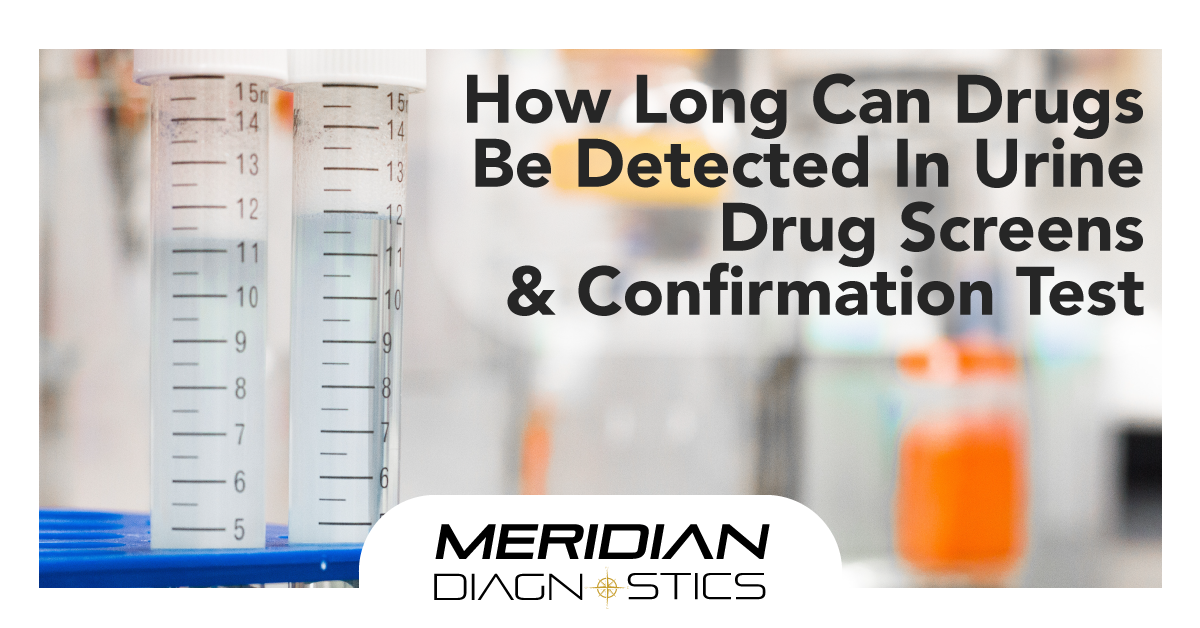How Long Can Drugs Be Detected In Urine Drug Screens & Confirmation Test
Urine drug screens test for the presence of specific drugs and medications. It's most commonly used in the workplace to detect substance abuse issues or in a medical setting, for doctors to check for prescription drug abuse or the use of illegal substances. Or, it may be used in emergency treatment, so that EMTs can quickly screen for drugs that could explain a patient's symptoms or unusual behavior.
A sensitive, accurate urine testing can make a difference in treating someone who may be having a medical emergency or ensuring that any disciplinary action at work is fair and based on accurate information.
We will answer some of the most common questions about drug tests including how far back they go.
It All Depends on the Type of Test
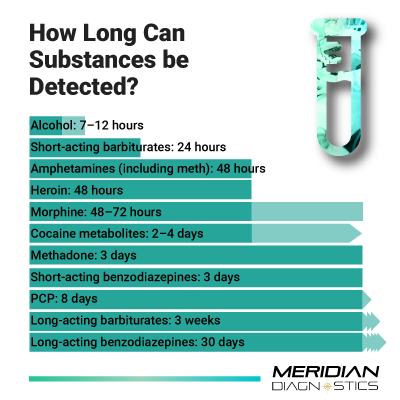 There are several different types of testing methods that are used for urine drug tests, each with its own advantages and limitations. One common method is the instant result "panel cup" test, which provides quick and preliminary results. These tests are often used in workplace settings and for initial screenings, but they may not be as sensitive as more advanced tests. Another common method is gas chromatography-mass spectrometry (GC-MS), which is a highly accurate and precise testing method that can detect even trace amounts of drugs in the urine. This method involves separating the urine sample into its individual components and then analyzing each component for the presence of drugs.
There are several different types of testing methods that are used for urine drug tests, each with its own advantages and limitations. One common method is the instant result "panel cup" test, which provides quick and preliminary results. These tests are often used in workplace settings and for initial screenings, but they may not be as sensitive as more advanced tests. Another common method is gas chromatography-mass spectrometry (GC-MS), which is a highly accurate and precise testing method that can detect even trace amounts of drugs in the urine. This method involves separating the urine sample into its individual components and then analyzing each component for the presence of drugs.
Another type of testing method that may be used for urine drug tests is liquid chromatography-tandem mass spectrometry (LC-MS/MS), which is a more recent and advanced testing method. LC-MS/MS is able to detect a wider range of drugs and metabolites than GC-MS, and it is also able to detect lower concentrations of drugs in the urine. “Using liquid chromatography mass spectrometry testing methods, we are able to identify several analytes throughout various drug classes and their corresponding metabolites in every urine specimen we run through the instrument. The science behind LCMS is so precise that we can result out how many nanograms per microliter of a substance are detected in every specimen,” says Rhyan Walcott, Meridian Diagnostics CEO. This makes it a particularly useful method for detecting prescription drugs and other substances that may be present in low concentrations. Ultimately, the choice of testing method will depend on a number of factors, including the specific drugs being tested for, the sensitivity of the test required, and the resources available for testing.
What Drugs Typically Show Up On a Test?
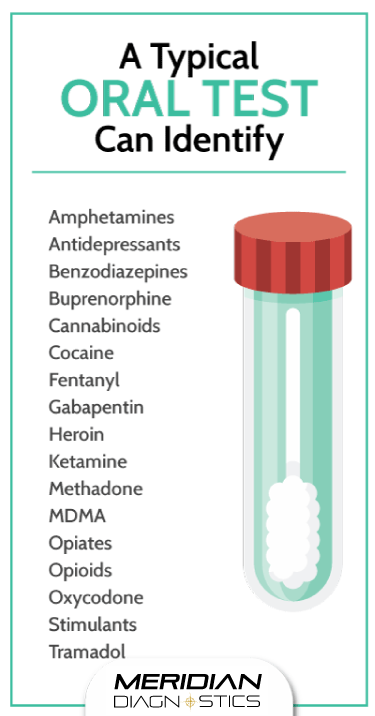
Typical drugs detected in an oral swab test
Urine tests can detect a variety of chemicals in the body, both legal prescription drugs and illegal narcotics. Common prescription drugs that may be detected are:
- Barbiturates
- Benzodiazepines
- Diuretics
- Erythropoietin
- Hydrocodone
- Hydromorphone
- Methadone
- Methaqualone
- Oxycodone
- Oxymorphone
- Propoxyphene
- Steroids and HGH
Urine screenings also pick up street drugs, such as:
- Cocaine
- Marijuana
- Opiates, including heroin, codeine, and morphine
- Phencyclidine (PCP)
- Amphetamines, including meth
Sensitive tests can detect not only the presence of one or more drugs in an individual's urine but also the amounts of each. Urine tests are an alternative to a breath test or blood test when an individual is suspected of consuming alcohol. They can also be used to detect nicotine and cotinine, which is a substance produced by the body as it breaks down nicotine in the system.
How Does the Amount of a Substance in Your System Factor Into Drug Testing?
Frequent or heavy use may cause the drug to remain in the system longer than occasional use. For example, using marijuana once may result in the drug being detectable for only a few days, while frequent, daily use means that the drug may remain in the person's system for up to a month after the person last used the drug.
For the most part, however, drugs and alcohol take about 2 hours to start showing up in a person's urine. While the amount of the drug you take can determine how long it stays in your system, the urine test itself simply tests for the presence of the drug, not the concentration of the drug in your urine.
For example, alcohol metabolizes at the rate of one drink per hour (an ounce of liquor or one 12oz. beer). If someone drank 10 shots, then alcohol would be detectable in their urine for about 10 hours, even if they stopped drinking several hours before the test was administered.
How Accurate are Drug Tests?
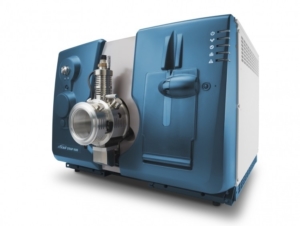 Urine drug tests use "cut-off levels," which indicate that a person's urine must contain a certain amount of the substance in order to be considered a positive result. For example, people that may eat a poppyseed bagel and then take a drug test may have a false positive for opium. To limit this and other accidental false positives, there's a threshold that must be reached in order for a test to be positive, which varies with each type of drug.
Urine drug tests use "cut-off levels," which indicate that a person's urine must contain a certain amount of the substance in order to be considered a positive result. For example, people that may eat a poppyseed bagel and then take a drug test may have a false positive for opium. To limit this and other accidental false positives, there's a threshold that must be reached in order for a test to be positive, which varies with each type of drug.
The type of test may also affect the results, as some methods are more sensitive and therefore, more accurate than others.
Testing strips typically test for the presence of a specific drug, one for each strip. In a lab test, however, which uses immunoassay, mass spectrometry, or chromatography, the results can be more accurate than a simple yes-or-no and may even be able to detect whether or not the person used the drug that day or if it's still in their system from using a day or more prior.
Detection Times For Different Drugs in Urine
Different drugs will have a different length of time for detection. How long depends n a few things, including:
- The person's body mass (how big or small they are)
- Hydration levels, for example, someone who is dehydrated may have a longer time that the drug is detected
- The acidity of the urine sample
- How long ago the person took the drug
- Whether or not the person is a heavy user of the drug
- How the drug was administered
- The concentration of a drug
A urine test can detect the presence of each drug within a certain period of time, but these times vary due to how long drugs take to be metabolized by the body. In general, expect drugs to stay in the system for:
- Alcohol: 7–12 hours
- Short-acting barbiturates: 24 hours
- Amphetamines (including meth): 48 hours
- Heroin: 48 hours
- Morphine: 48–72 hours
- Cocaine metabolites: 2–4 days
- Methadone: 3 days
- Short-acting benzodiazepines: 3 days
- PCP: 8 days
- Long-acting barbiturates: 3 weeks
- Long-acting benzodiazepines: 30 days
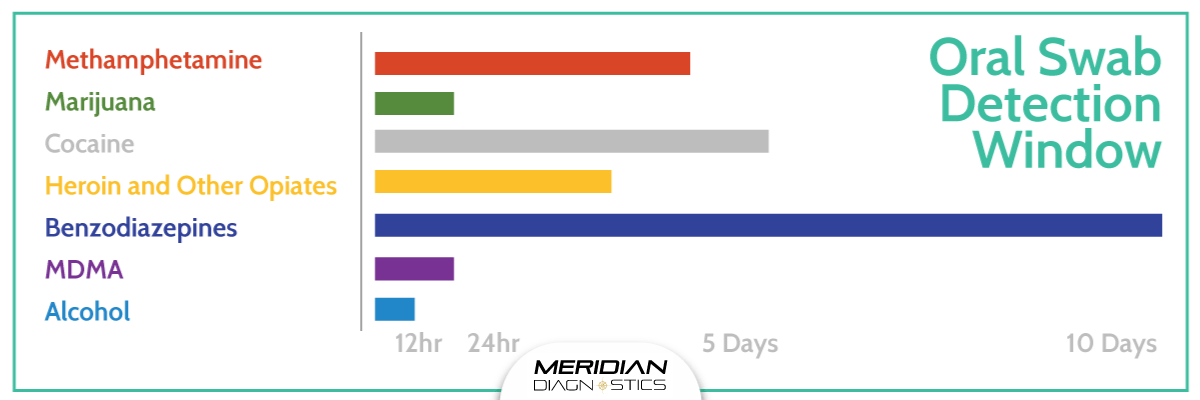
The more sensitive the test and the more accurate the lab conducting the test is, then the more reliable the results will be. Rhyan Walcott, Chief Executive Officer at Meridian Diagnostics, states "Many of our toxicology clients range from drug rehabilitation and medically assisted treatment (MAT) centers, to hospitals and primary care physicians. Meridian Diagnostics recognizes that fast results are key in the healthcare space, so we ensure that our state of the art mass spectrometers are routinely maintained and provide the most accurate results."
Once You Take a Urine Drug Test, How Far Back Do They Go?
The answer relies on 3 factors:
- Which substance
- The quantity of the substance
- The testing and sensitivity of the test.
The amount of time that a urine drug test can detect drugs in your system depends on the substance and quantity used. Different drugs have different metabolites that can remain in your body for different periods of time. For example, marijuana can be detected in urine for up to 30 days after use, while cocaine is typically only detectable for a few days. The more drugs that are used, the longer they will remain detectable in your urine. See our graphic on timelines for general detection guidelines.
The type of drug test you take can also impact how far back the results can go. An instant result "panel cup" test is typically less sensitive than a mass spectrometry or chromatography test at a diagnostic laboratory. Panel cup tests are often used for quick and preliminary results, but they may not detect lower levels of drugs that a more sensitive test would pick up. Mass spectrometry and chromatography tests are much more precise and can detect even trace amounts of drugs in your system, making them a better option for diagnostic purposes. Ultimately, the detection window for urine drug tests will vary depending on the individual, the substance used, and the type of test administered.
How Long Does it Take to Get Results of a Urine Drug Test?
The length of time it takes to receive results from a urine drug test can vary depending on the type of test being performed. Instant result "panel cup" tests can provide results in a matter of minutes, making them a convenient option for quick screenings. However, these tests are typically less sensitive and may not detect lower levels of drugs that a more accurate test would pick up. In contrast, more advanced tests like mass spectrometry and chromatography tests are typically sent to a diagnostic laboratory for analysis and can take anywhere from a few days to a week to receive results. While these tests take longer to process, they are much more precise and can detect even trace amounts of drugs in your system.
The time it takes to receive results from a urine drug test can also depend on factors such as the workload of the laboratory and the complexity of the test. For example, if a laboratory is experiencing a high volume of tests, the processing time may be longer. Additionally, if a test requires additional analysis or confirmation, it may take longer to receive results. In general, if you have concerns about the timing of your results, it is always best to consult with the laboratory or healthcare provider performing the test for more information.
Are there things you should do to prepare for a urine drug test?
Before taking a urine drug test, there are several things that you should avoid in order to ensure accurate results. First and foremost, it is important to avoid using any substances that could potentially show up on the test. This includes both illegal drugs as well as prescription medications that may be detected. If you are unsure whether a medication could interfere with the results of your drug test, it is always best to consult with your healthcare provider before taking the test. You should inform your technician of any medications you have taken that may show up in results.
Another important thing to avoid before a urine drug test is excessive fluid intake. While it is important to stay hydrated, drinking too much water or other fluids can dilute your urine and potentially affect the accuracy of the test. It is generally recommended to avoid drinking excessive amounts of fluids for at least a few hours before the test. Additionally, it is important to avoid consuming any substances that could alter the pH level of your urine, such as citrus fruits or acidic beverages. These can also affect the accuracy of the test and should be avoided in the hours leading up to the test. Ultimately, it is important to follow any specific instructions provided by the healthcare provider or laboratory administering the test to ensure accurate results.
It is important to note that attempting to "beat" a urine drug test by masking or diluting the results is not only unethical, but it is also highly unreliable. There are many myths and false methods circulating about how to avoid detection, such as drinking excessive amounts of water or using detox products. However, these methods are often ineffective and can lead to even more serious consequences. In fact, many labs are aware of these methods and have measures in place to detect when someone has tampered with their sample. Attempting to cheat the system can not only result in a positive test, but it can also lead to criminal charges and serious legal consequences. It is always best to be honest with your healthcare provider about any drug use and to follow the appropriate steps to address any issues that may arise.
Do You Need Reliable Drug Screening and Confirmations?
If you need reliable, accurate drug screening & confirmation services, choose Meridian Diagnostics. We offer a wide range of laboratory services, including urinary tract infection testing, blood tests, and respiratory pathogen panel testing. Contact us online today to learn more about our services.

